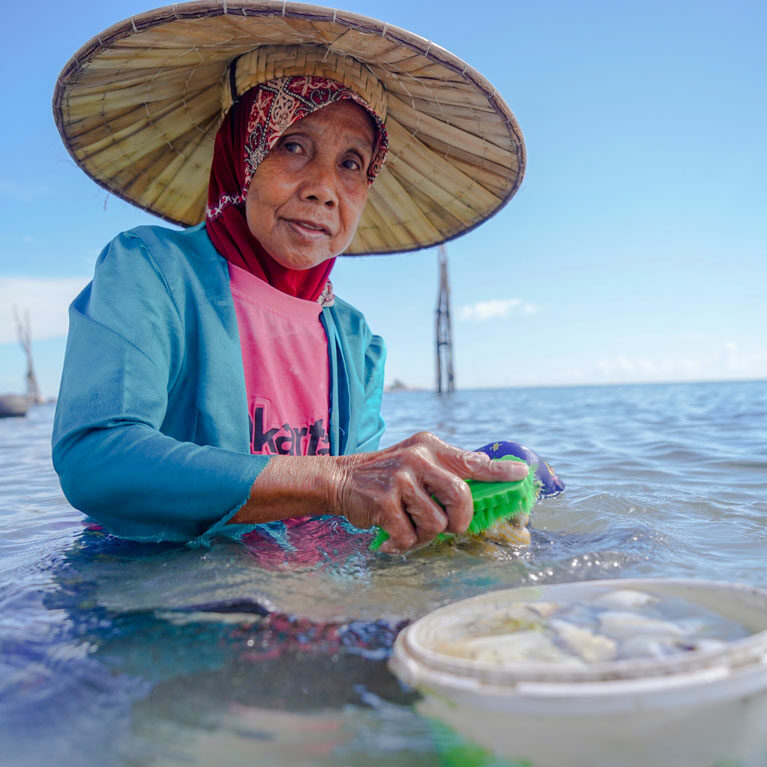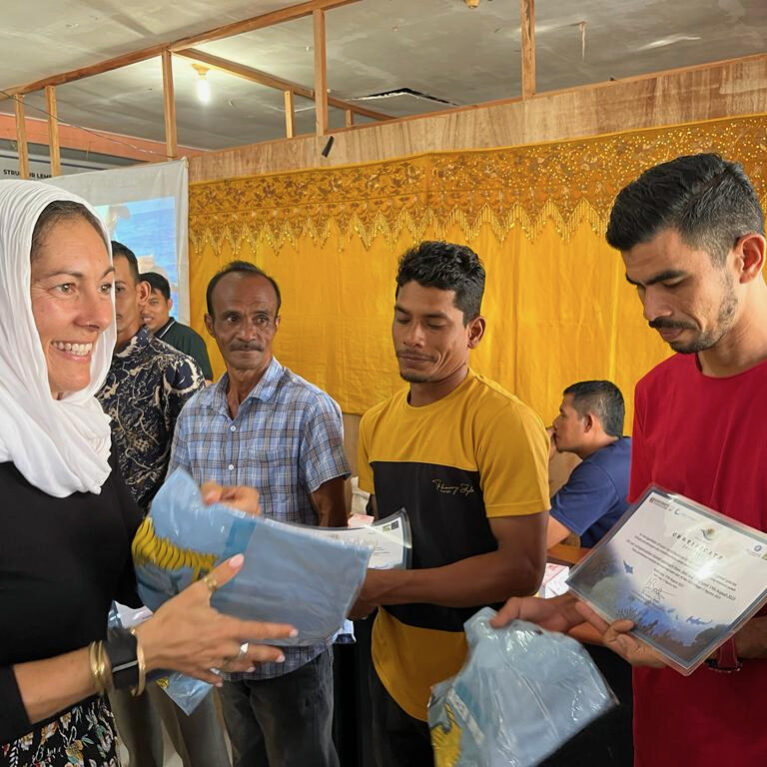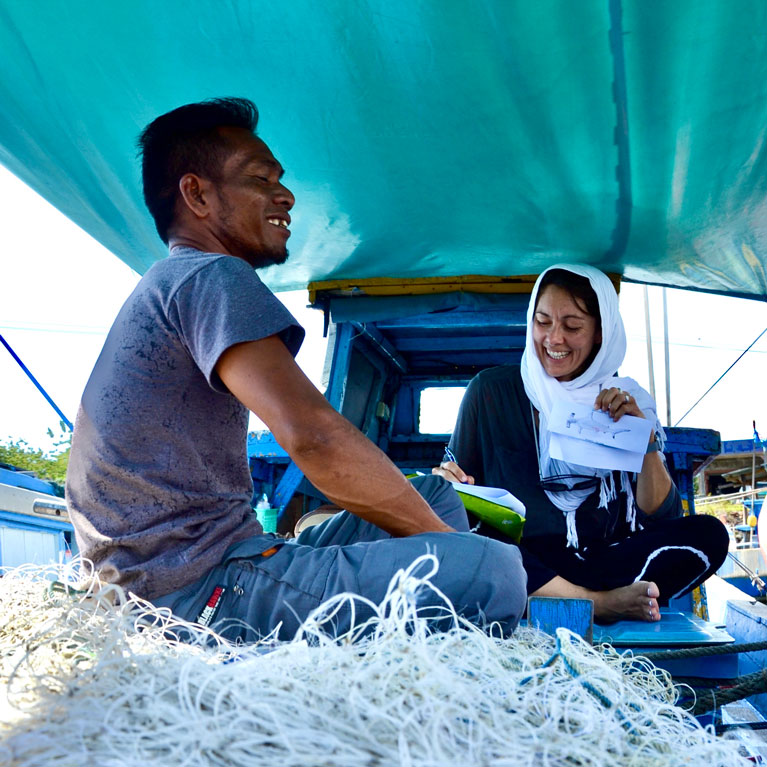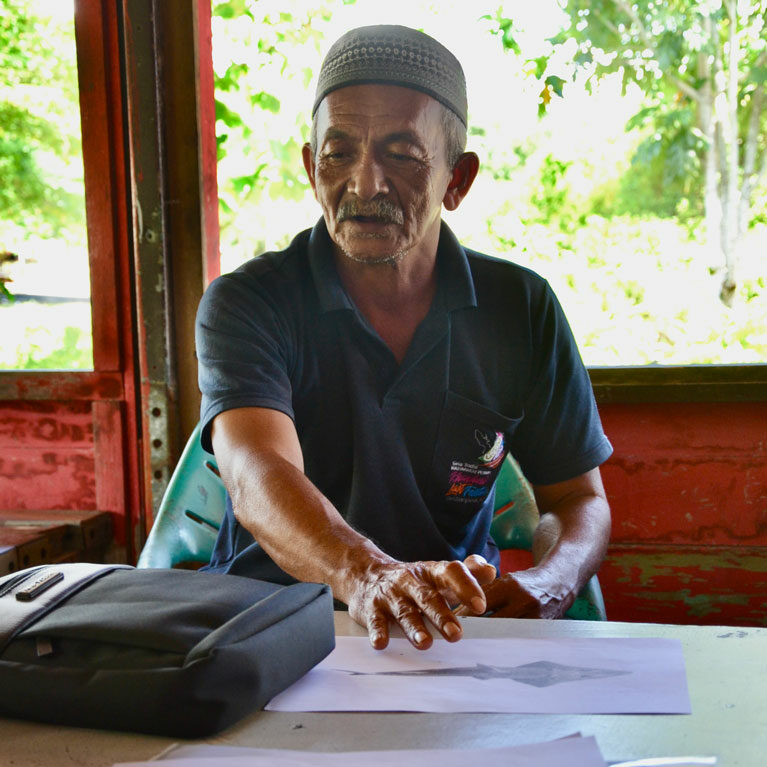Solutions for shark fisheries in a Surfer’s Paradise
Hollie is investigating how marine tourism can contribute to conservation in the global diving treasure that is Indonesia. Nestled in the heart of the ‘Coral Triangle’, Indonesia is an archipelago of contrasts: it is both a global biodiversity hotspot, and the world’s largest shark fishing nation. By focusing on the tourism hotspots of Kuta and Palau Weh, and the fishing communities of Tanjung Luar and Aceh Jaya, Hollie is searching for ways to reduce the threats facing sharks in fisheries.
I am a conservation scientist with a decade of experience working on cross-cutting conservation issues in challenging contexts. I’ve always felt that people and nature are intrinsically linked and that all lives – human and animal – deserve moral consideration. Because of my interest in nature and social justice and my thirst for knowledge and exploration, conservation science has always felt like my ideal career path. My career and research background have been quite diverse, spanning three continents and several themes. My field-based experience includes shark and ray management and illegal manta ray trade in Indonesia (Wildlife Conservation Society),...




Solutions for shark fisheries in a Surfer’s Paradise
The primary objective of my project is to reduce threats to Critically Endangered sharks and rays (in particular hammerhead sharks and wedgefish) in Indonesia’s fisheries while ensuring that ocean-dependent local people are at least no worse off as a result of shark conservation.
Sharks and rays (elasmobranchs) are threatened with extinction, primarily as a result of overfishing, and Indonesia is the world’s largest elasmobranch fishing nation. There is a need to reduce the capture of endangered elasmobranchs in the country’s fisheries. However, most of the fisheries are small-scale and the people involved are highly dependent on marine resources – including elasmobranchs – for their food security and livelihoods. This project aims to address this challenge by generating economic incentives for small-scale fishers to reduce their catches of endangered elasmobranchs.
Sharks and rays are one of the world’s most threatened species groups, mainly because they are overfished. Indonesia is a global priority for shark conservation, since it is the largest shark-fishing nation in the world. Wedgefish and hammerhead sharks are two of the highest priority groups for shark conservation in Indonesia, since they are Critically Endangered and yet are still caught and traded in large numbers. However, implementing effective shark management in Indonesia is complicated by the ubiquity of small-scale fisheries (more than 95% of the country’s fleet is small-scale), with difficult trade-offs between conservation objectives and the role of shark fishing in the livelihoods and well-being of coastal communities. People are highly dependent on marine resources, including sharks, for their lives and livelihoods and there is little incentive for local people to protect shark and ray populations. Payment for ecosystem service schemes, which does provide an incentive for local people to deliver conservation outcomes, offers a potential solution. However, it has yet to be applied to shark conservation and there is little information about how fishers might respond to incentives for shark conservation. It can also be difficult to secure long-term funding for such payments to continue into perpetuity. On the other hand, shark and ray tourism in Indonesia is highly valuable: shark diving generates revenues of at least US$22-million per year. However, shark fishers are not typically well placed, in terms of location and capacity, to receive economic benefits from shark tourism. Rather, most tourism value is captured by a small number of companies. This represents an opportunity to transfer some of this tourism value to fishers with performance-based payment for ecosystem service schemes to reduce shark fishing, financed by the tourism industry.
This project aims to:
- Predict how incentives will influence fishers’ decisions to capture and retain wedgefish and hammerhead sharks in two case study small-scale fisheries and estimate the resulting impact on fishing mortality.
- Estimate whether donations from dive tourists can support performance-based payment schemes for shark fishers in two case study dive destinations near the case study fisheries.
- Pilot a performance-based incentive scheme with volunteer fishers and assess the cost, impact on fisher behaviour and impact on fishing mortality of wedgefish and hammerhead sharks using on-vessel and forensic monitoring of compliance.
- Work with all relevant stakeholders (fishers, NGOs, tourism, government) to put the results of the research and pilot into operation and establish a mechanism for long-term performance-based incentives for shark conservation with funding from the tourism sector.
- Build capacity for innovative applied research in Indonesia by collaborating with local universities and Master’s students, NGOs and government scientific officers throughout the project.

